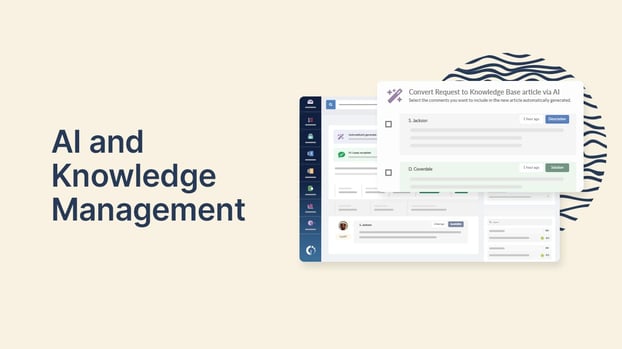An updated knowledge base is an essential part of an organization's self-service offering. But keeping it updated is no easy task. What if you could have artificial intelligence (AI) work for you and help you with Knowledge Management? That’s what InvGate Service Management Knowledge Article Generation feature does!
According to a report by Microsoft, 88% of respondents expect a brand or organization to offer self-service support, and 66% begin with self-service when in need.
So, it’s crucial to have up-to-date knowledge base articles to avoid frustrating your users and to decrease the ticket volume your help desk has to handle.
Let’s see how this new capability can help.

What is InvGate Service Management Knowledge Article Generation?
The Knowledge Article Generation feature allows you to transform service incident resolutions into knowledge article drafts in under 30 seconds. The result? Time savings for help desk agents and updated knowledge base for the rest of your employees.
This new feature is part of InvGate Service Management AI Hub, a series of capabilities that put AI in the service of IT teams to enable every other team in the company.
How to turn help desk ticket resolutions into knowledge articles
Let’s say an end-user submitted a new issue – something a bit strange that you’ve hardly seen before – and you managed to fix it and are very pleased with how the solution turned out. Until now, you would have to take that information, open the knowledge base, and manually create a new article to add it to the database.
Now, after you solve a ticket, you can choose to convert it into an article draft by clicking on the “Generate” button in the dialog box with the magic wand above the ticket. The system then takes in the primary details from the initial request and the main activity that took place in order to solve it and generates a first document leveraging generative AI.
In less than 30 seconds (according to internal testing), the rough copy is done, and you can start the review, edit, and submission process for its approval.

What is AI in Knowledge Management?
The term "AI in Knowledge Management" refers to the use of artificial intelligence technologies to enhance the collection, organization, and dissemination of information within an organization.
In a traditional Knowledge Management system, users input data, and teams manually maintain knowledge bases. AI takes this to the next level by automating these processes, making knowledge more accessible and actionable.
AI-driven systems can intelligently categorize information, suggest relevant content, and even answer questions based on the context of the query, offering a much more dynamic and user-friendly experience.
As companies face ever-growing amounts of data, AI plays a critical role in extracting meaningful insights from vast knowledge repositories. It can identify patterns in user behavior, anticipate information needs, and provide personalized recommendations, making it easier for teams to access the knowledge they need when they need it. This not only improves efficiency but also enhances decision-making and overall service delivery.

How can AI help in Knowledge Management?
AI has transformed Knowledge Management by enhancing its efficiency and capability. With artificial intelligence, organizations can leverage machine learning, natural language processing (NLP), and predictive analytics to streamline how knowledge is created, stored, and accessed.
This ensures that users have the right information at their fingertips, whether it’s customer service teams looking for solutions or employees searching for internal data.
AI can revolutionize how organizations handle their knowledge by enabling automated knowledge discovery, content creation, and smart recommendations.
Let’s break down some of the specific ways AI can improve Knowledge Management.
1. Automated knowledge discovery
AI can automatically sift through large volumes of data to identify useful information. It helps locate patterns, highlight relevant knowledge, and make it accessible without the need for manual searches.
2. Content creation and updates
AI can assist in generating new content by analyzing gaps in knowledge bases and suggesting areas for improvement. It can also keep existing content updated by scanning for outdated information and proposing updates accordingly.
3. Intelligent search
With AI-powered search capabilities, employees can use natural language queries to find the information they need, rather than relying on specific keywords. This makes finding information quicker and easier, saving time and reducing frustration.
4. Personalization of knowledge delivery
AI can tailor the knowledge users see based on their past interactions, roles, and preferences. This ensures that users receive the most relevant information without having to sift through irrelevant content.
5. Predictive analytics
By analyzing patterns in user behavior, AI can predict what information users might need next and present it proactively, improving workflow and minimizing downtime.

5 benefits of using AI in Knowledge Management
1. Increased efficiency
AI automates routine tasks, such as content tagging and information retrieval. It streamlines processes, so employees can spend less time searching for knowledge and more time applying it to their work. This efficiency also translates into faster service delivery for customers.
2. Enhanced decision-making
By using AI to analyze vast amounts of data and extract insights, organizations can make more informed, data-driven decisions. AI identifies trends and patterns that would otherwise go unnoticed, giving leaders the tools they need to act with confidence.
3. Improved user experience
AI makes information access more intuitive. By personalizing content recommendations and delivering relevant knowledge exactly when it's needed, AI significantly improves the user experience for both internal teams and customers. This leads to greater satisfaction and more effective use of available knowledge.
4. Continuous learning and knowledge evolution
AI allows Knowledge Management systems to evolve continuously by learning from user interactions. This ensures that the knowledge base remains relevant and current as AI adapts to changing needs, improving the overall quality of information over time.
5. Scalability
As organizations grow, the demand for knowledge scales up too. AI makes it easier to manage expanding knowledge repositories by automating data categorization, content creation, and information updates. This scalability helps businesses maintain high service standards even as they grow.

5 challenges of using AI in Knowledge Management
1. Data quality issues
AI is only as effective as the data it processes. Poor-quality or incomplete data can lead to inaccurate results, affecting the overall effectiveness of the Knowledge Management system. Organizations need to invest in ensuring that their data is clean and well-structured to maximize AI's potential.
2. High initial costs
Implementing AI technologies often comes with a significant upfront investment. While AI promises long-term benefits, organizations must carefully plan their budgets to manage the costs of acquiring and integrating AI tools into their existing systems.
3. Complexity in integration
Integrating AI with legacy Knowledge Management systems can be challenging, particularly for organizations that are not yet equipped to handle cutting-edge technology. The complexity of this integration can lead to implementation delays, increased technical overhead, and potential disruptions to current operations.
4. Data privacy concerns
With AI processing large amounts of data, there is an increased risk of data privacy violations. Organizations need to ensure that they comply with data protection regulations and secure sensitive information, especially when dealing with customer or employee data.
5. Over-reliance on AI
While AI can automate many processes, it still requires human oversight to ensure its outputs are relevant and accurate. Over-reliance on AI without regular human checks and balances can result in errors and potentially cause businesses to miss critical insights or updates.

To sum up
AI can have multiple uses for IT support. You can use it to generate AI responses, summarize tickets, and create knowledge articles.
Combining AI and Knowledge Management can go a long way and impact the business significantly. In fact, we also added AI capabilities to our Virtual Agent, so that it can offer your end-users with contextualized knowledge article summaries.
In this case, by being able to create a draft article in less than a minute, you’re easing the first step and encouraging them to start. With just a button and the help of GenAI, you’ll have more articles on your knowledge base, fewer tickets created, improved collaboration thanks to better knowledge sharing, and ultimately an up-to-date resource for your entire company. Plus, you will be capturing valuable insights from incident resolutions on the go!
And this is just one feature included in the AI Hub. If you want to enable your cloud instance’s AI Hub, just go to Settings > AI Hub and activate it! The free beta is available to all cloud customers.
Don’t have InvGate Service Management yet? Then go fetch a 30-day free trial now!
Frequently Asked Questions
1. What is InvGate Service Management Knowledge Article Generation?
InvGate Service Management Knowledge Article Generation is an AI-powered feature that converts help desk ticket resolutions into knowledge article drafts in under 30 seconds. This tool saves time and ensures your knowledge base stays updated.
2. How does AI improve Knowledge Management?
AI improves Knowledge Management by automating tasks such as content creation, knowledge discovery, and intelligent search. It streamlines access to relevant knowledge resources and keeps knowledge bases up to date, making it easier for teams to access organizational knowledge.
3. How can AI assist with knowledge gaps in an organization?
AI can identify and address knowledge gaps by analyzing existing content, suggesting areas for improvement, and automating the process of updating outdated information. This leads to a more robust and accurate knowledge management system.
4. What are the benefits of using AI in Knowledge Management?
AI enhances knowledge management processes by increasing efficiency, improving decision-making, enhancing user experience, enabling continuous learning, and scaling as your business grows. AI-driven tools make it easier to access relevant knowledge and manage knowledge assets.
5. What challenges might arise from using AI in Knowledge Management?
Some challenges include data quality issues, high initial costs, complexity in integrating AI with existing systems, potential data privacy concerns, and over-reliance on AI without proper human oversight.
6. Can AI-generated knowledge articles improve service delivery?
Yes, AI-generated knowledge articles improve service delivery by speeding up the creation process, making relevant information more accessible, and reducing the volume of tickets your help desk has to handle, which results in a more efficient knowledge management strategy.















